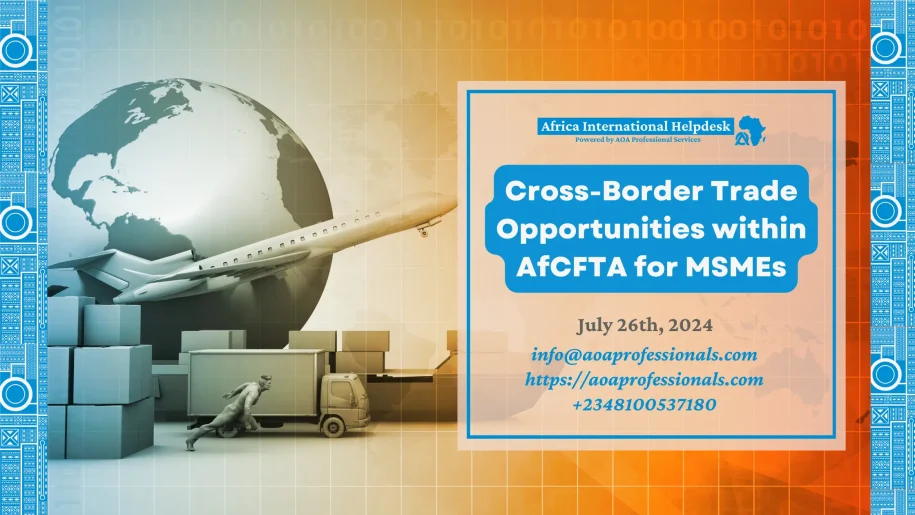The African Continental Free Trade Area (AfCFTA) presents a transformative opportunity for Micro, Small, and Medium Enterprises (MSMEs) across Africa. By creating a single market for goods and services, AfCFTA aims to enhance intra-African trade and stimulate economic growth. This article explores key opportunities for MSMEs within AfCFTA, supported by relevant case studies.
Market Expansion
AfCFTA opens access to a market of over 1.2 billion people, allowing MSMEs to expand beyond their national borders. This wider market offers opportunities to increase sales and diversify customer bases, significantly boosting growth potential.
Reduction in Tariffs
One of the primary benefits of AfCFTA is the reduction and eventual elimination of tariffs on 90% of goods traded within the continent. This reduction makes it cheaper for MSMEs to import raw materials and export finished products, enhancing their competitiveness.
Easier Access to Raw Materials
AfCFTA facilitates the sourcing of raw materials from neighboring countries at lower costs due to reduced tariffs. MSMEs can benefit from improved supply chain management and reduced production costs, enabling them to offer more competitively priced products.
Enhanced Competitiveness
With the elimination of trade barriers, MSMEs can benefit from economies of scale and become more competitive on a global scale. Enhanced competitiveness can lead to increased innovation and efficiency, positioning MSMEs as key players in the market.
Standardization of Regulations
AfCFTA aims to harmonize trade regulations and standards across member countries. This standardization reduces the complexity of cross-border trade and helps MSMEs comply more easily with regulatory requirements, streamlining their operations.
Investment Opportunities
AfCFTA encourages investment in infrastructure and industrialization, creating new opportunities for MSMEs to collaborate with larger firms and attract foreign investment. Improved infrastructure facilitates smoother logistics and distribution networks.
Regional Value Chains
MSMEs can participate in regional value chains by providing specific components or services to larger manufacturers or exporters. This integration into value chains can enhance skills, productivity, and market presence.
Trade Facilitation
AfCFTA includes measures to facilitate trade, such as simplifying customs procedures and enhancing transparency. These measures reduce the administrative burden on MSMEs and speed up the movement of goods across borders.
Access to Finance
Initiatives under AfCFTA aim to improve access to finance for MSMEs by creating a more integrated financial market. MSMEs can benefit from better access to credit and investment opportunities, fostering growth and expansion.
Capacity Building
AfCFTA encourages capacity-building programs to help MSMEs improve their business practices, compliance with standards, and overall competitiveness. These programs can include training, mentorship, and technical assistance, empowering MSMEs to thrive in the continental market.
Case Studies
Nigerian Fashion Industry
A Nigerian fashion MSME, previously limited to local markets, leverages AfCFTA to export garments to Ghana and Kenya. By sourcing fabrics from Côte d’Ivoire at reduced tariffs, the business lowers production costs and offers competitive pricing internationally, resulting in increased market share and profitability.
Kenyan Agribusiness
A Kenyan agribusiness MSME, producing organic teas, partners with a distributor in South Africa. The elimination of tariffs on agricultural products under AfCFTA allows the business to expand its reach and increase sales volume, enhancing profitability and market presence.
Ghanaian Tech Start-Up
A Ghanaian tech start-up specializing in mobile payment solutions collaborates with telecom companies in Uganda and Tanzania. The harmonization of regulatory standards across AfCFTA countries facilitates easier market entry and compliance, enabling the start-up to scale its operations and increase its customer base.
Conclusion
AfCFTA presents substantial opportunities for MSMEs by creating a more integrated and expansive market, reducing trade barriers, and fostering a conducive environment for growth and competitiveness. MSMEs can harness these opportunities to scale up, innovate, and contribute significantly to economic development across Africa. As MSMEs navigate the evolving trade landscape, leveraging the benefits of AfCFTA will be crucial for their sustained growth and success.


Leave a Reply